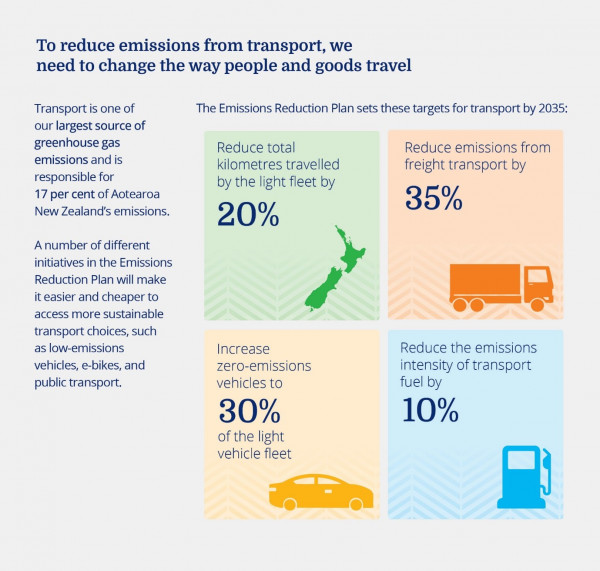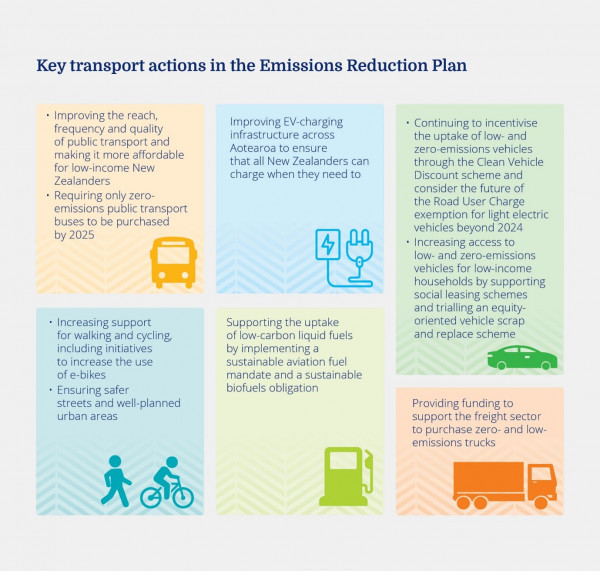What you need to know
The Climate Change Response (Zero Carbon) Amendment Act 2019 introduced 2050 emissions reduction targets that are consistent with the Paris Agreement’s commitment to limit warming to 1.5˚C above pre-industrial levels. The targets require gross emissions of biogenic methane to reduce to at least 10% below 2017 levels by 2030 and to at least 24 to 47% by 2050. Emissions of all other greenhouse gases must reach net zero by 2050. This last target is the one that applies to transport.
The Zero Carbon Act also put in place the institutional architecture to achieve the 2050 targets. This established the Climate Change Commission, and includes a system of emissions budgets that aim to achieve the reduction targets in a series of steps, and a requirement for governments to develop emissions reduction plans.
Our work programme seeks to reduce transport emissions and contribute to New Zealand’s international commitments.
The work to date
Decarbonising Transport Action Plan 2022-2025
Aotearoa New Zealand needs a well-functioning, low-emissions transport system that supports everyone to get where they need to go, access the things they need, and spend time with the people they care about.
Sustainable Aviation Aotearoa takes flight
A new leadership body that brings government agencies together with the private sector has been set up to tackle domestic aviation emissions.
Read more in the media release from Te Manatū Waka and the terms of reference.
Summary of Submissions Hīkina te Kohupara
On the 14 May 2021 the Minister of Transport released Te Manatū Waka’s (the Ministry of Transport’s) green paper Hīkina te Kohupara – Kia mauri ora ai te iwi - Transport Emissions: Pathways to Net Zero by 2050’. It sets out potential pathways and policies to phase out emissions across the transport system.
Hīkina te Kohupara discussion document released
The Government is seeking feedback on options to accelerate the transport sector to meeting the draft advice and recommendations of the Climate Change Commission, and moving to a net zero carbon transport system by 2050.
The Transport Emissions Action Plan
The major part of the work programme is the development of the Transport Emissions Action Plan (TEAP). This will be our strategic plan for how New Zealand could reduce its transport emissions. It will be the basis of the transport section in the Government’s Emissions Reduction Plan for the 2022–25 emissions budget.
Green Freight working paper released
This project looks at the role alternative fuels — electricity, green hydrogen and biofuels — could play in reducing emissions from heavy road freight vehicles. We released a strategic working paper in May 2020 for public comment.
Planned accession announced to reduce harmful air pollutant emissions
New Zealand is working through its accession to the International Maritime Organization (IMO) convention, MARPOL Regulations for the Prevention of Air Pollution from Ships. It is also the platform for IMO action to reduce greenhouse gas emissions from ships, with further measures set to be adopted in 2023.
Plan to address international emissions reconfirmed
International aviation and maritime are major sources of emissions. Although they do not count as part of New Zealand’s emissions profile, the Ministry for the Environment estimates that if they did then international aviation would be responsible for 16% of transport emissions and international maritime for 5%.
Low emission vehicle work underway
The emissions from light vehicles we drive, are the largest source of transport emissions, accounting for nearly 70%. We need to reduce light vehicle emissions if carbon dioxide emissions are to reach net zero.

